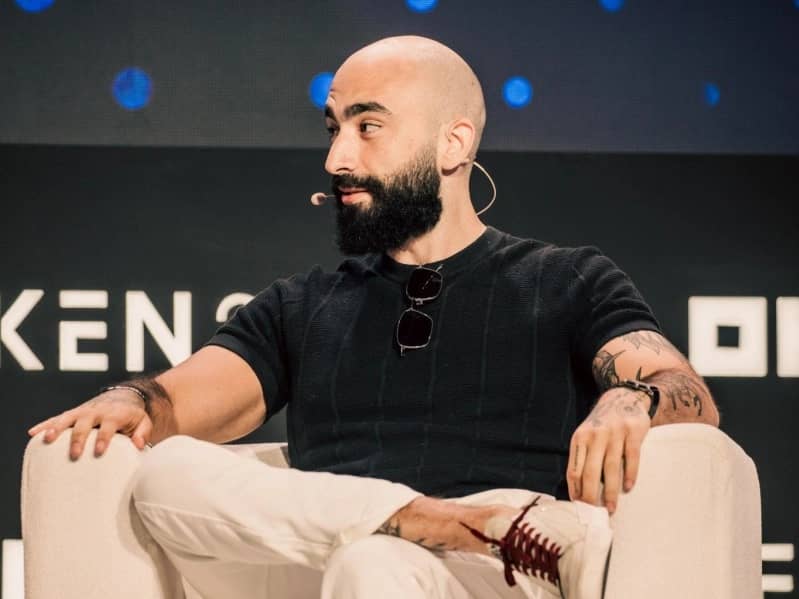订阅 wiki
Share wiki
Bookmark
Mert Mumtaz
0%
Mert Mumtaz
Mert Mumtaz 是 Helius 的联合创始人兼首席执行官 (CEO),Helius 是一家为 Solana 区块链 提供的开发者基础设施公司。 他是 加密货币 社区中的一位杰出人物,以其技术评论、对 Solana 生态系统的积极倡导以及在社交媒体上的活跃表现而闻名。 [1] [2]
早年生活
穆姆塔兹出生于土耳其伊斯坦布尔。童年时期,他的家人搬到了加拿大尼亚加拉瀑布,原因是他的父亲担心土耳其的政治局势。在成长过程中,他积极参与格斗运动,包括摔跤、橄榄球和自由搏击,最初计划通过体育奖学金进入皇后大学。后来,他将重心转移到学术上,原因是他意识到知识的价值,他幽默地将其归因于玩电子游戏《上古卷轴5:天际》。 [2]
教育
Mumtaz在尼亚加拉瀑布的斯坦福学院高中就读。他在大学攻读工程学位,并被一所精选的应用数学项目录取,在那里他遇到了未来的Helius联合创始人。他还曾在黑莓公司实习一年。后来,他获得了佐治亚理工学院的计算机科学硕士学位。 [2] [3] [13]
职业生涯
Mumtaz 的职业生涯始于科技公司 BlackBerry 和图片素材公司 Shutterstock,担任过各种职务。[4] [5] 之后,他曾在加拿大五大银行中的三家从事传统金融工作,专注于网络安全、交易基础设施和数字支付。随后,他加入 Michele Romanow 创立的 Clearbanc 公司,担任工程师构建支付系统。正是在 2021 年初的这段时间里,他开始关注 加密货币 在解决跨境支付效率低下的潜力。[2]
2021 年 4 月,Mumtaz 加入 Coinbase,担任平台团队的软件工程师,大约在该公司上市前一周。在 Coinbase 工作期间,他研究了各种区块链,并对 Solana 产生了浓厚的兴趣,并在业余时间为其生态系统构建了多个 非同质化代币 (NFT) 机器人。2022 年 6 月,他离开 Coinbase,与他在大学数学课程中认识的 Liam Vovk 和 Nick Pennie 共同创立了 [Helius](https://iq.wiki/wiki/helius)。[\[2\]](#cite-id-m74KQzpfCl)
Helius
Helius 是一家开发者基础设施和工具公司,旨在支持在 Solana 区块链 上进行开发的开发者。该公司提供远程过程调用 (RPC)、Webhooks 和 API 等服务,旨在简化网络上的开发过程。[1] 该公司由 Mumtaz、Liam Vovk(前 TikTok 员工)和 Nick Pennie(前 AWS 员工)创立,他们是平等的合伙人。[2]
2024 年,Helius 宣布已完成由 Foundation Capital 领投的 950 万美元 A 轮融资。本轮融资的著名参与者包括 Solana 联合创始人 Anatoly Yakovenko 和 Raj Gokal。这笔资金旨在扩大公司的工程团队并加强其基础设施产品。[1] [6]
在 Solana 生态系统中的作用
Mumtaz 被认为是 Solana 生态系统的重要且直言不讳的倡导者。在 2022 年底 加密货币 交易所 FTX 倒闭后,他积极努力恢复人们对该网络的信心,从而声名鹊起。他以在社交媒体平台 X(前身为 Twitter)上的活跃表现而闻名,他在该平台上利用自己的技术背景来解决他认为的关于 Solana 工程和性能的虚假信息。 [2]
尽管他积极倡导,但 Mumtaz 也是该生态系统的直言不讳的批评者,旨在推动内部改进。他公开批评推广他认为具有误导性的指标,例如主要由机器人驱动的虚报活跃用户数量。他还强调了技术缺陷,例如 Solana 的应用程序二进制接口 (ABI) 问题,他指出 以太坊虚拟机 (EVM) 生态系统对此处理得更好。 [2]
2025 年 2 月,在发生几起备受瞩目的诈骗事件后,Mumtaz 公开为 Solana 辩护,反对将其标记为“meme 币赌场”的批评。他认为,少数恶意行为者的行为不应定义整个生态系统,该生态系统托管着数千名合法的开发人员。他将 2017 年 首次代币发行 (ICO) 热潮与 以太坊 进行了 类比,当时也有很高比例的项目被确定为欺诈项目,以此论证此类挑战并非 Solana 独有。 [7]
公开立场和提案
Mumtaz 经常分享他对加密货币的广泛影响的看法,并为 Solana 生态系统提出新的想法。
“资本主义 2.0”论点
Mumtaz 认为,加密货币 应该被理解为“资本主义 2.0”,而不是“Web 3.0”。他认为,“Web 3.0”的标签贬低了这项技术的意义,他认为这是资本主义体系的根本演变。根据他的论点,加密技术增强了资本主义的核心组成部分,例如不可变的产权、透明的信息流动和无摩擦的资本流动。 [8]
Solana对齐的稳定币
在2025年9月,Mumtaz提议创建一种与Solana对齐的稳定币,以解决他所说的“收益泄漏”问题。他认为,网络上的主要稳定币会从其储备中获取收益,并将其用于资助竞争生态系统。他的提议建议,一种新的稳定币可以将收益从其储备中重新导向Solana生态系统,可能通过SOL代币回购或销毁。他后来完善了这个想法,建议可以由竞争的数字资产国库公司(DAT)实施。 [9]
对代币化的怀疑
Mumtaz对所有形式的加密基础设施进行代币化的必要性表示怀疑。在2025年9月与Solana联合创始人Anatoly Yakovenko的公开讨论中,他质疑加密钱包拥有自己的代币的效用。Yakovenko认为,任何有收入的项目都应该有一个代币,以便将利润返还给持有者,但Mumtaz认为,这样的举动可能会改变基础设施的根本目的。 [9]
天使投资
Mumtaz 活跃于科技和金融服务领域的天使投资,专注于 Web3、加密基础设施和软件开发应用。他的投资组合包括对 20 多家公司的投资,例如 Monad、Berachain、Eclipse 和 Zeta Markets。他曾与 Robot Ventures 和 Electric Capital 等公司以及包括 Anatoly Yakovenko 在内的个人共同投资。 [10] [3]
争议
2025年1月,Helius前首席基础设施工程师Miles Smith(已于2023年离开该公司)在社交媒体平台X上发布了一系列针对Mumtaz的指控。Smith指责Mumtaz营造有毒的工作环境,包括对供应商进行言语辱骂。他还声称Helius通过使用竞争对手QuickNode的服务来掩盖内部性能问题,从而虚报其技术正常运行时间。其他指控包括不正当获取名为“Xray”的黑客马拉松项目,以及Mumtaz积极破坏Smith随后的筹款努力。 [6]
Mumtaz公开否认了所有指控,称“根本没有发生过这样的事情”。他将Smith描述为他解雇的“心怀不满的员工”,并称Smith多年来一直在“骚扰”他。Mumtaz暗示这些指控是为了引起人们对他自己商业冒险的关注而捏造的。 [6]
面试
变革发生时 #01
2024年11月28日,Mert Mumtaz参加了YouTube节目《变革发生时》(第98集)的访谈,标题为《Mert Mumtaz:Solana如何达到1000美元(并让你致富)》。在这次对话中,他讨论了他对Solana 区块链发展的看法、Helius Labs的活动以及他个人背景的各个方面。
Mumtaz将Solana描述为一个可以作为全球计算系统的平台,使个人能够创建直接通过市场动态进行测试的应用程序。他解释说,在Founders Fund的投资支持下,Helius Labs提供基础设施,旨在简化和加速Solana生态系统内的开发。
在谈到2022年FTX崩溃后的事件时,Mumtaz表示,这一事件最终通过消除有害影响并加强对技术进步的关注,对Solana产生了建设性的影响。他表示,Solana可以在全球金融和技术领域抓住大规模机遇,并认为其代币最终可能达到1000美元以上的价值。
除了技术和市场方面的考虑之外,讨论还包括他对数字资产行业虚假信息的关注,以及他相信优先采取直接行动而不是进行广泛辩论。Mumtaz还提到了早年丧母等塑造了他对韧性和纪律的看法的人生经历。他强调了在竞争激烈的技术领域保持势头和避免自满的重要性。 [14]
Mert Mumtaz 谈 Solana、公司文化和冒险精神 #02
2025年4月29日,Y轴播客以 Helius 的联合创始人兼首席执行官 Mert Mumtaz 为嘉宾,讨论的重点是创业、组织文化和 Solana 区块链。在访谈中,Mumtaz 描述了他的职业生涯轨迹,包括他在 Coinbase 的经历以及他决定在 Solana 生态系统中建立开发者平台 Helius 的决定。
Mumtaz 认为,创业既需要风险承受能力,也需要建立清晰的文化框架。他表示,Helius 在招聘时重视动机和与公司目标的契合度,而不是仅仅关注正式的资格。他还指出,在远程优先的环境中,书面沟通在维护团队成员之间的协调、透明度和效率方面起着核心作用。
从技术角度来看,Mumtaz 解释了他对 Solana 架构的立场,强调其利用硬件容量来实现更高可扩展性的设计理念。他将此与其他的 区块链 模型进行了对比,他认为这些模型更依赖于软件抽象。他还谈到了 加密货币 行业的激励结构,认为短期金融利益的主导地位给可持续发展和长期创新带来了挑战。
对话还涵盖了人工智能融入专业工作流程的问题。Mumtaz 认为人工智能在编码支持和构思等任务中很有用,但对其产生真实的文字沟通能力持保留态度。他的言论描述了他对创业公司建设、工作场所实践、区块链设计以及 加密货币 领域经济动态的看法。 [15]
发现错误了吗?
